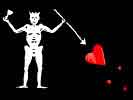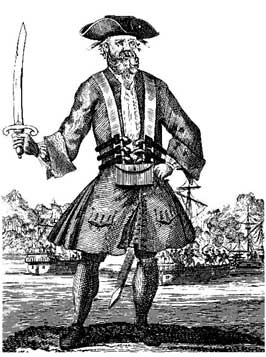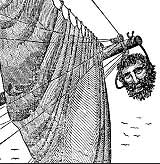to
those that cooperated with him, but at the same time he did
not waste time with those who fought him or did not cooperate
with him. There is a story of a man that refused to give Blackbeard
his jewelry so rather than fighting with him, Blackbeard simply
cut the man's hand off. Unlike some other pirates, Teach was
not known to be a very barbaric and demented pirate who tortured
victims for fun, but instead he usually just went after valuables.
His demonic image he created actually added to the stories
of his wickedness.
Teach
was also apparently a ladies man, as it is said that he had
around 14 wives. He treated women kindly and fell in love
easily and treated each like his first love. Only his last
marriage to a 16-year-old young lady (thought to be Mary Ormond)
is believed to be legitimate since he was properly married,
but this happened during his last year of his life. His previous
marriages were conducted on board his ship and were almost
a commonplace ritual to the crew.
In
1716, Teach began his pirating career when he met the well-known
pirate Benjamin Hornigold at New Providence. Hornigold took
Teach on as an apprentice and he proved to be a quick study.
Sometime in early 1717, Hornigold gave Teach his own command
of a sloop and together they wrecked havoc in the following
months. Later in the year, off of the island of St. Vincent,
the two pirate sloops closed on a merchantman and soon captured
it. The ship was a large Dutch-built French guineaman named
Concord, which Teach had a liking for. Hornigold allowed him
to claim this prize ship as Teach's new command. Hornigold
decided to retire from pirating since the English King offered
a pardon for pirates, so now Teach was on his own.
The
Concord was re-christened Queen Anne's Revenge and fashioned
into a pirate ship by installing about 40 guns. With such
a large and well-armed ship as this, Teach would began his
notorious pirate career. Soon after he set sail again, Teach
and his crew sighted another large merchantman off St. Vincet
named Great Allen. The Great Allen eventually surrendered
and Teach cleaned the ship of valuables and set her on fire
after putting the crew ashore. News of this engagement soon
spread and in a few days Queen Anne's Revenge came across
the British 30-gunned man-of-war HMS Scarborough, which was
sent out to deal with the prospering pirate. Rather than run
from the warship, which he could have done with his faster
ship, Teach decided to battle the man-of-war since he never
ran away from a battle. A running duel soon started that lasted
hours, and the British warship was decidedly losing the fight
to the skillful pirate crew. The British captain realized
this and began to withdraw which Teach allowed since there
would be no real use for continuing the attack on the warship
since it would not be carrying any cargo that the pirates
sought. Teach's reputation increased dramatically after this
incident - a pirate that can defeat a British man-of-war deserves
respect.
Teach
soon began to increase his reputation once again by creating
his well-known Blackbeard persona. He knew that if he looked
frightening then ships might surrender to him sooner. He let
his hair grow and started a beard that would almost cover
his face. He twisted his long hair and beard in pigtails and
he was known to tie colored ribbons on the ends. During battle
he put lit slow burning hemp cord under his hat near his ears
that would smoke and envelop him in a cloud. To add to his
menacing appearance he also wore several pistols (as much
as six) along with his knives and cutlass at his waist. He
himself created the name "Blackbeard" and soon his
frightful image was well known. While in battle the opposing
crew often surrendered at the mere sight of him in a rage,
some even called him the Devil-incarnate. Obviously Teach's
Blackbeard persona worked! The fear his new image created
had the psychological effect he wanted.
Blackbeard
soon encountered the pirate sloop Revenge commanded by Major
Stede Bonnet, and upon the sight of the proper looking gentleman,
Blackbeard laughed aloud. The two became friendly to one another
and it was agreed to sail together as partners, but soon after
Blackbeard realized Bonnet was not much of a seaman. Teach
"convinced" Bonnet of this and so he sent one of
his own lieutenants to take over command of Revenge while
Bonnet went aboard Queen Anne's Revenge as a "guest."
Bonnet's crew heartily cooperated with Blackbeard's idea since
they also knew of Bonnet lacking pirating ability. The two
Revenge's were soon joined by another captured sloop, the
Adventure, which Blackbeard assigned Israel Hands to command.
(As a side note, Robert Louis Stevenson used the name "Israel
Hands" as one of Long John Silver's fellow pirates in
his classic fiction novel Treasure Island.)
In
May 1718, Blackbeard's pirate fleets appeared at Charleston,
South Carolina. Soon they were stopping every vessel entering
and leaving the harbor. Almost ten vessels were plundered
before Charleston acted on the reoccurring problem. All incoming
vessels were soon diverted from entering Charleston harbor
and all vessels already within the harbor remained in port
because of the siege from Blackbeard's fleet. Before this
happened though, Blackbeard was able to take many important
high-ranking citizens as prisoners hoping they would be useful.
He held them for ransom for medical supplies and threatened
to kill them all if he did not get his wish. Several days
after sending one of the hostages and two of his crew to deliver
the ransom note, he received his medical trunk and true to
his word he released all the prisoners without a loss of life.
Now
it was time for Blackbeard to retire from pirating and take
advantage of the same pardon Hornigold took earlier. But before
he would do this, Blackbeard came up with a devious plan to
let him and a select few of his crew (about 40 men) keep the
most valuable plunder. He would load one ship with the best
treasure and leave the rest of the crew behind - now all he
needed to do was to execute his plan. At Topsail Inlet (now
known as Beaufort Inlet), North Carolina, Queen Anne's Revenge
"accidentally" ran aground on a sandbar and Blackbeard
called Israel Hands aboard Adventure to help him free the
ship; and in the process, Hands also ran "accidentally"
aground. Teach then told Bonnet that he should seek the pardon
too and the Major agreed, especially after Teach promised
that he would return to him the command of Revenge. Shortly
after, Bonnet and some of his crew left on a small boat for
the acceptance of the pardon at nearby Bath, NC. In the meantime,
Teach set the rest of his plan in motion - he began to load
all of the valuables onto Adventure. When about 25 men of
the crew realized what was really happening, he simply marooned
them as he set sail with the fully treasure-laden Adventure.
Meanwhile, Bonnet received his pardon and papers needed for
Revenge and returned to the scene. There he found his ship
waiting for him as expected, but very unexpectedly all the
valuables were gone. He soon found the marooned men and vowed
revenge on Blackbeard of this treachery, but he was unsuccessful
at ever catching him.
Blackbeard
and his men went to receive their pardons from North Carolina
Governor Charles Eden and Teach soon settled in Bath Town.
Eden and Teach spent much time together so it is believed
Eden had access to Blackbeard's loot since the two become
friends. Teach eventually met his last wife here while in
his retirement, and this time around the governor legally
married them. By mid 1718, the pirate life soon tempted Blackbeard
back to his old trade and he was once again off-and-on pirating,
although at times he tried to cover it up. While off Ocracoke
Island in September 1718, Blackbeard spotted another pirate
again, this time Charles Vane (in a few months a crewman on
Vane's ship, Jack Rackham or "Calico Jack", would
supercede him.) The two pirate ships saluted each other and
soon the two crews gathered for a few days of typical pirate
celebrating.
Soon
citizens and neighboring Virginia Governor Alexander Spotswood
feared the large gathering of pirates and rumors began to
spread that a planned pirate haven would be set up. Spotswood
began to organize a military force to rid Blackbeard. HMS
Pearl and HMS Lyme were selected for the task but their captains
informed the governor that their large ships would not be
able to navigate the waters. Spotswood then offered up his
own money to lease two sloops for the specific job, Ranger
and Jane, which would be crewed by the warship men. First
lieutenant Robert Maynard of HMS Pearl was selected to lead
the two ships for the hunt while Captain Brand of HMS Lyme
would lead ground forces.
The
two sloops set out for Blackbeard's hideout at Ocracoke Island
and arrived on late November 21, 1718. The next morning, the
battle began. The two leased sloops were unarmed so they had
to fight only with small guns and swords, but Blackbeard's
sloop Adventure had 9 guns so he was able to fire at the approaching
sloops. At their approach, Adventure set sail and fired at
the sloops but there was very little wind so there was not
much speed in the chase so oars were needed. Ranger was essentially
knocked out from a lethal broadside shot from Adventure so
Maynard moved in alone with Jane. Jane managed to damage Adventure
enough, and Maynard ordered most of his crew below decks to
bluff Blackbeard into thinking the crew was killed. His bluff
worked, when the two ships were alongside one another, Blackbeard
and several of his crew boarded Jane. At this time, Maynard's
armed and waiting crew below deck surfaced and a raging hand-to-hand
battle ensued. Soon Maynard and Blackbeard were fighting each
other in duel of naval officer versus pirate - a fight between
good and evil. After Blackbeard wounded Maynard's fingers
with a cutlass blow, Maynard moved back and shot him but had
little effect in stopping Blackbeard. Several other Jane crewmen
fought with Blackbeard after this before his numerous wounds
eventually overcame him. (It has also been stated that Blackbeard
was decapitated by a sword blow to the back of the head during
the fighting rather than getting his head removed after his
death.) Maynard later commented that Blackbeard fell with
at least five gun shot wounds and at least 20 sword wounds.
Blackbeard's severed head was hung from Maynard's sloop's
bowsprit as a trophy and also to prove that the legendary
Blackbeard the pirate was indeed dead
|



